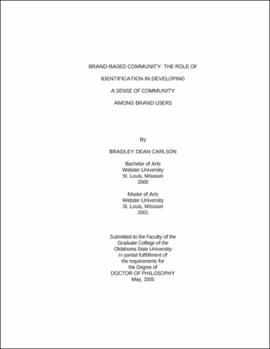| dc.contributor.advisor | Brown, Tom J. | |
| dc.contributor.author | Carlson, Bradley Dean | |
| dc.date.accessioned | 2013-11-26T08:25:40Z | |
| dc.date.available | 2013-11-26T08:25:40Z | |
| dc.date.issued | 2005-05 | |
| dc.identifier.uri | https://hdl.handle.net/11244/6814 | |
| dc.description.abstract | Scope and Method of Study: Previous research on brand community (i.e. McAlexander, Schouten, and Koenig 2002; Muniz and O'Guinn 2001) has established a rich qualitative foundation for understanding brand-based communities. The current research offers conceptual and empirical triangulation of sorts to existing research by specifying and operationalizing relevant constructs for quantitative analysis. | |
| dc.description.abstract | This research applies the dominant social psychological framework of community (e.g. Glynn 1981; Sarason 1974) to existing knowledge on branding, brand community, and relationship marketing to examine the social nature of brands. Study One of the dissertation offers the conceptualization of psychological sense of community (PSC) as applied to the relationships among consumers, other users, and brands as well as the development of a psychometrically sound measure of the construct. The operationalization of PSC begins by adapting existing measures from the social psychology literature (Buckner 1988; Obst, Zinkiewicz, and Smith 2002) and augmenting them with new items developed for this study. Appropriate techniques are employed to assess the construct validity of the resulting measure. | |
| dc.description.abstract | Study Two involves an empirical test of a conceptual model of antecedents and consequences of PSC. Drawing from recent discussions of organizational identification (Bergami and Bagozzi 2000) and consumer-company identification (Bhattacharya and Sen 2003), the results reveal that identification with the brand positively influences identification with other users of the brand, which positively influences PSC. The results support the positive influence of PSC on brand commitment and commitment to the community, which in turn moderate the influence of PSC on brand preference, positive word-of-mouth about the brand, attending brand events, and sharing the brand history. | |
| dc.description.abstract | Findings and Conclusions: The results of this research offer a psychometrically sound measure of the PSC construct along with a new perspective on consumer-brand relationships to add to the existing brand community literature. The results should allow managers an enhanced understanding of drivers of the relationships between consumers, other users, and their brands. | |
| dc.format | application/pdf | |
| dc.language | en_US | |
| dc.rights | Copyright is held by the author who has granted the Oklahoma State University Library the non-exclusive right to share this material in its institutional repository. Contact Digital Library Services at lib-dls@okstate.edu or 405-744-9161 for the permission policy on the use, reproduction or distribution of this material. | |
| dc.title | Brand-based community: The role of identification in developing a sense of community among brand users | |
| dc.contributor.committeeMember | Suter, Tracy A. | |
| dc.contributor.committeeMember | Mowen, John C. | |
| dc.contributor.committeeMember | Dacin, Peter | |
| osu.filename | Carlson_okstate_0664D_1303.pdf | |
| osu.accesstype | Open Access | |
| dc.type.genre | Dissertation | |
| dc.type.material | Text | |
| thesis.degree.discipline | Business Administration | |
| thesis.degree.grantor | Oklahoma State University | |
